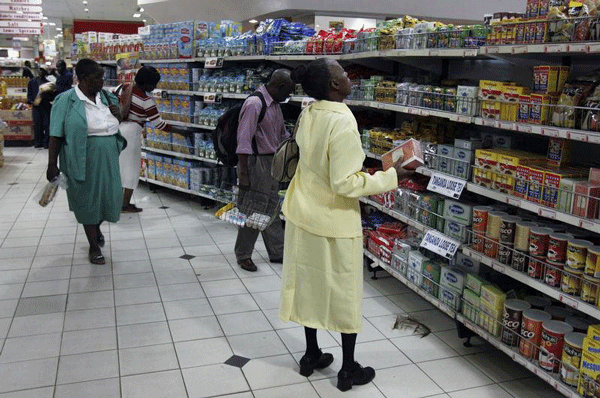
JULIA NDLELA/LORRAINE NDEBELE THE cost of living in Zimbabwe continues to spiral out of control with prices of basic commodities eroding salaries for most workers who are paid in Zimbabwean dollar.
Prices of basic commodities like groceries, petrol, rentals and electricity tariffs continue to increase with inflation shooting to 191,7% as of June 2022.

Zimbabweans have endured high prices and a hyperinflationary environment, which has drastically reduced their buying power. Using the official and parallel exchange rate on an average excluding the US$175 paid to civil servants, a nurse is currently earning equivalent to US$79 at the official rate and US$42,85 at the parallel market rate. Consumer Council of Zimbabwe spokesperson Christopher Kamba said prices have been on an upward trend since January. He said the rising prices were due to the foreign currency parallel market rate, which manufacturers and retailers have for long grappled with.
“Local tuckshops are demanding payment in US dollars which is now at ZW$690 or ZW$750 to US$1. The economy is experiencing a sharp increase in prices for basic commodities especially cooking oil and mealie-meal, which are also fast disappearing from shelves because of speculation by both consumers and suppliers,’ Kamba said.
“The fall of the local currency and surging inflation have increased demand by most local supermarkets for payments using the US dollar and putting further pressure on the Zimbabwean dollar.
“The CCZ has noticed that some retailers (mostly local tuckshops) are selling a two-litre unit of cooking oil for between US$5,50 and US$7, resulting in consumer panic and a further spike in prices,” he added.
Kamba explained that the US dollar price component started increasing after the Russia-Ukraine conflict, which has affected global supply chains.
- Chamisa under fire over US$120K donation
- Mavhunga puts DeMbare into Chibuku quarterfinals
- Pension funds bet on Cabora Bassa oilfields
- Councils defy govt fire tender directive
Keep Reading
The local currency continues to depreciate with the parallel market rates ranging between ZW$690 and ZW$750 to US$1, which is double the official bank rate, which currently stands at US$1: ZW$379, 22
A snap survey by the Independent this week showed that several supermarkets in Harare were in short supply of goods like bread and cooking oil. Some retailers are demanding payments of some goods in US dollars.
A comparison of the price of mealie meal, cooking oil, sugar, beef, and bread, among other, basic commodities showed a steep increase in July compared to April.
Mealie meal which was pegged ZW$1 271.55 (US$3,35 using the current auction rate of ZW$379,22:US$1) in April has risen to ZW$4 729,99, with beef, which was selling for ZW$1 329,90 per kilogramme, now costs ZW$3 690. The price of a loaf of bread has jumped from ZW$273,99 to ZW$700, while cooking oil has increased from ZW$1 179,99 in April to ZW$3 299,99.
Confederation of Zimbabwe Retailers president Denford Mutashu said shortages of some basic commodities were due to supply and payment constraints.
“The capacity to restock has been diminished by inflation, high interest rates, and the ever rising parallel market exchange rate,” he said.
“Hike in interest rates led to businesses adjusting pricing to capture the increase as a direct cost of doing business. Business is faced with environmental, internal and geopolitical factors piling misery ultimately on the consumer.”
Mutashu said forex shortages remained a major hurdle.
“Finance minister Mthuli Ncube said the government was not ready to use price controls but directed retailers to stick to the interbank rate at a time parallel market rate is spiraling. This has been interpreted as price control. The measures have done more harm than good,” he said.
Meanwhile, bread supplies are expected to improve following recent shortages as the National Bakers Association has allayed fears of further scarcity.
Bread shortages were recorded in recent days after flour prices increased by 26%.
National Bakers Association of Zimbabwe president Denis Wala said: “A week or two ago, National Foods Limited stopped milling/producing bread flour citing limited stocks of wheat due to remittance challenges and this affected bakers. However, beginning this week National Foods is now producing flour so you will see changes.
“The glitch resulted in bread shortages last week. We faced a similar crisis three years ago when we had challenges in terms of flour.”
Wala said bakers were making two million loaves of bread per day but due to raw materials shortages, they were reduced production to 1,5 million loaves.
Grain Millers Association of Zimbabwe chairperson Tafadzwa Musarara last week told the press that National Foods Limited and three other major millers temporarily stopped milling flour due to limited stocks and remittance challenges.
The temporary food shortages were experienced after President Emmerson Mnangagwa used the Presidential Powers Act to ban retailers from selling goods at exchange rates above 10% of the prevailing interbank rate.
Economist Godfrey Kanyenze said the economic environment was polarised with a disconnection between the market and the government controlled rates.
“Even if the government comes up with policies to regulate, the market will reject the policies if they feel that what the government is doing is not favourable to business,” he said.
“The social contract between the government and the market is broken and that needs to be mended before any other measure is put in place. The confidence in public institutions is very low.”
In its latest report on the country’s food security outlook for June 2022 to January 2023, the Zimbabwe Vulnerability Assessment Committee (ZimVac) said most households were likely to remain food constrained.











